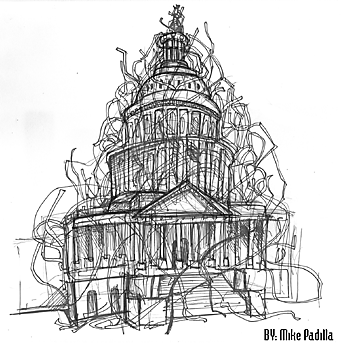
Illustration by Mike Padilla
|
|
By Rui Wang
Arizona Daily Wildcat
Wednesday, April 27, 2005
Print this
"Damn it, why does this always happen?" my friend said as he pulled a jumbled nest of guitar cords out of his bag. "No matter how neatly you put something away, it always ends up a huge mess."
Maybe there's a leprechaun that lives in his bag and tangles up the cords when he's not looking. But another culprit is just the fact that entropy - the measure of chaos and disorder - is ever increasing in our expanding universe. Things never want to stay the way they should.
Look in the news and you'll see entropy visualized: a commuter train in Japan derailed from its tracks, squished like an aluminum can against the side of an apartment building. Over the weekend, two sets of bombs went off in Iraq that killed another 24 civilians, and the Bush administration got a little more uncomfortable under the collar as the deadline for forming a new government approaches. By now, we're so used to instability in that part of the world that two dozen lives snuffed out hardly even registers anymore.
In Ecuador last week, former President Lucio Gutierrez was forced out after popular discontentment reached a boiling point after he stacked the Supreme Court with favorable justices. Gutierrez then tried to appease the angry nation by disbanding that Supreme Court, but it was too late to save his presidency.
Ecuador's no stranger to entropy: Three presidents have been ousted and replaced since 1997. In the universe of Ecuadorian politics, that's like three successive big bangs in less than 10 years, each preceding its own buildup of disorder and corruption until the center collapses.
Here in the United States, our buildup of entropy would seem to occur a little slower, but it's definitely increasing. Take the judicial nominations impasse: The Democrats in the Senate have used the power of filibuster to block 10 Bush-nominated appellate court candidates; in response, the Republicans are threatening to do away with the filibuster altogether.
Senate Democratic leader Harry Reid refers to this troubling possibility as the "nuclear option," a tactic that would escalate a full-scale, tit-for-tat political battle in the Senate and probably throughout the country. Reid has tried unsuccessfully to strike a deal with Republican leader Bill Frist - if you withdraw a couple nominees, we'll confirm a couple - but the party with the power isn't likely to agree to any deals that won't give it everything it wants.
Over the past couple hundred years, the Senate has built an orderly, collegial atmosphere in which to conduct business - unlike that rambunctious House across the way. Getting rid of the filibuster, the ability to delay Senate action on any matter by essentially talking it to death on the floor, would jeopardize the order that's been built. It would be too much to say that the whole Senate would immediately fall into chaos and disorder, but it's sure to breed an incredible level of resentment and hamper productive bipartisanship. If such a thing still exists. In addition, it has the potential to affect not only the federal district and circuit courts, but also the Supreme Court should an opening occur during the second Bush administration.
If the filibuster power is removed, it also has the potential to start an entropic chain of events that may lead to a severe restriction of or an overturning of Roe v. Wade, the decision that affirmed a woman's right to choose an abortion. Like it or not, the network of abortion providers, doctors, nurses, counselors and right-to-choose organizations around the United States is an established social institution. The concept of abortion, the idea that it's a possibility and an option - whether it's ultimately exercised or not - is an established mindset for a large portion of the population. To erode that right would represent a huge disturbance to the set of rights that a woman possesses.
The Republicans' attempt to force through judicial nominees by possibly removing the filibuster power is not really on par with the Ecuadorian ex-president dismissing 27 of 31 Supreme Court justices and filling them with his own appointments, but maybe it'll have a similar political effect. Polls show that two-thirds of Americans disfavor removing the filibuster. After all, Americans really do seem to like their checks and balances of one party over another. Combined with the other signs of entropy and anxiety in our society - a struggling economy, an unstable, insurgent Iraq, unreasonable environmental policies in light of problems such as global warming and limited oil reserves, and no progress in the war on terror - members of the majority just may find themselves ousted sooner rather than later.
Rui Wang is a third-year law student. She can be reached at letters@wildcat.arizona.edu.
